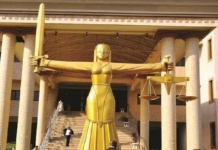
By Olakunle Agboola – The relationship between Black Americans and Africa has been shaped by centuries of history, media portrayals, and cultural exchanges. Despite shared ancestry, many Black Americans hold perceptions of Africa influenced by Western media rather than firsthand experiences. Similarly, many Africans grow up with an idealized image of America, only to be shocked by reality upon arrival.
The history of Black Americans and Africans is deeply intertwined, yet many within these communities struggle to relate to each other. This divide, often exacerbated by misinformation, media portrayal, and historical wounds, has hindered a collective effort to reconnect and collaborate. However, as more individuals from both sides engage in travel, dialogue, and cultural exchange, there is hope for a stronger and more united Black diaspora.
Africa’s Global Image
Western media, including major news outlets like CNN and BBC, have played a significant role in shaping global perceptions of Africa. The continent is often depicted through narratives of poverty, disease, and corruption. While these issues exist, they do not define Africa. Rarely does mainstream media highlight Africa’s economic growth, technological advancements, or cultural vibrancy. Cities like Lagos, Nairobi, Accra, and Johannesburg—hubs of innovation and entrepreneurship—are rarely showcased.
For decades, Africa has been portrayed as a continent in constant crisis, a narrative that overlooks the significant strides the region has made in education, business, and technology. Countries like Kenya, South Africa, Nigeria, and Ghana boast thriving technology sectors, hosting startups that have received global recognition. Agriculture, entertainment, and infrastructure development are also making Africa one of the fastest-growing economies in the world. However, these stories remain underreported in Western media, further entrenching outdated stereotypes.
Black America’s View of Africa
Many Black Americans grow up believing Africa is underdeveloped and struggling. This perception is reinforced by an education system that rarely delves into Africa’s history beyond slavery. The lack of African history in American curricula has contributed to a limited understanding of Africa’s diverse cultures, civilizations, and achievements. Without this knowledge, many Black Americans only see Africa through the lens of media narratives, which often reinforce poverty and instability.
However, social media and African-led storytelling are gradually changing this narrative. Platforms like YouTube, Instagram, and TikTok allow Africans to showcase their lives, businesses, and culture. Through documentaries, travel vlogs, and business collaborations, more Black Americans are beginning to explore Africa beyond the limited Western portrayal. Black Americans who visit Africa often return with a transformed perspective, realizing the continent is far more advanced than they imagined.
Additionally, African Americans who engage with African entrepreneurs and leaders find growing opportunities for investment and partnership. This shift in perception is crucial for building economic and social bridges between the two communities.
Africa’s Perception of America
Conversely, many Africans grow up believing America is a land of endless opportunity and wealth, a narrative shaped by Hollywood movies and social media. For decades, American pop culture has dominated African entertainment, showcasing images of wealth, luxury, and success. From music videos to blockbuster films, the United States is often depicted as a paradise of financial success and prosperity.
Upon arrival, many African immigrants quickly realize that the reality is far different. They are confronted with homelessness, systemic racism, and economic struggles that challenge the idealized image they had believed in. Many find themselves navigating a system that is far from the idealized image they had believed in. While opportunities exist, the American Dream is not guaranteed for all.
For many African immigrants, the struggle to integrate into American society includes facing discrimination from both white and Black communities. They must navigate a system where Black Americans have fought for centuries for civil rights, often feeling disconnected from this struggle. This creates an additional layer of complexity in how African immigrants relate to their Black American counterparts.
Between Africa and the West
Western nations invest heavily in controlling their global image through Hollywood and major media networks, promoting an image of prosperity and modernity. Africa, on the other hand, lacks global media representation, leading to a distorted narrative. Without actively promoting its own stories, Africa’s successes remain overlooked. African governments and media creators must invest in storytelling and technology, particularly social media platforms, to reshape their global image. Countries like China have successfully countered Western narratives through media control, a model Africa could emulate.
Africans must also be aware that much of the negative press about Africa is deliberate. Many Western nations maintain economic and political dominance by ensuring Africa is seen as weak and dependent. By highlighting instability and corruption while ignoring Africa’s advancements, the West continues to control the global narrative.
The Struggle to Relate
A major obstacle to unity between African immigrants and Black Americans is a lack of mutual understanding. Many African Americans feel disconnected from Africa due to the legacy of slavery, while African immigrants often fail to grasp the historical struggles Black Americans have faced in the U.S. This cultural divide leads to tension and misunderstanding. Some believe this division is intentional—a systemic effort to prevent unity between Africans and Black Americans, as a united Black diaspora would be a powerful socio-political force.
While many African immigrants see America as a land of opportunity, Black Americans who have lived under systemic oppression may feel differently. African immigrants, who may not immediately experience the generational impact of racism in America, often fail to fully understand the challenges that Black Americans face daily. These differences in perspective create a divide that is difficult to bridge.
Reconnecting with Africa
In recent years, Black Americans have sought to reconnect with their African heritage by naturalizing into Ghana and other West African countries. Ghana’s “Year of Return” campaign in 2019 encouraged Black Americans to visit, invest, and even settle in Africa. Countries like Sierra Leone, Nigeria, and Senegal have also opened pathways for African Americans to claim citizenship and reintegrate into African society. For many, this is more than just reclaiming identity—it is about belonging and contributing to Africa’s development.
As more Black Americans relocate or invest in Africa, they are discovering the continent’s wealth of opportunity. From real estate to tech startups, Africa offers potential that many had previously overlooked. Many African nations are now welcoming Black Americans with open arms, seeing their return as an opportunity to strengthen economic and cultural ties.
Building a United Black Diaspora
The perception gap between Black Americans and Africans is largely a result of media influence and limited first-hand experiences. While Western media has historically shaped Africa’s image negatively, modern technology allows Africans to reclaim their narrative. Similarly, Africans must recognize that America, despite its opportunities, has its own challenges. Through dialogue, cultural exchange, and education, both communities can build a stronger, more accurate understanding of each other.
To bridge this divide, African and Black American communities must actively seek collaboration. Education, business partnerships, and cultural exchanges can foster unity. Social media campaigns and African-led film and media projects can also play a crucial role in reshaping perceptions.
Ultimately, unity between Black Americans and Africans requires effort from both sides. As more Black Americans explore Africa and more Africans gain a nuanced understanding of America, the barriers of misinformation will begin to crumble. A connected and informed Black diaspora has the potential to reshape global perceptions and create a stronger, more empowered future for all.








